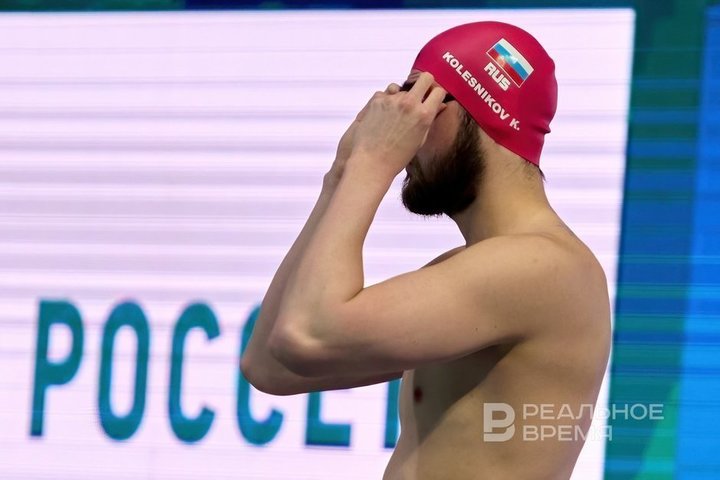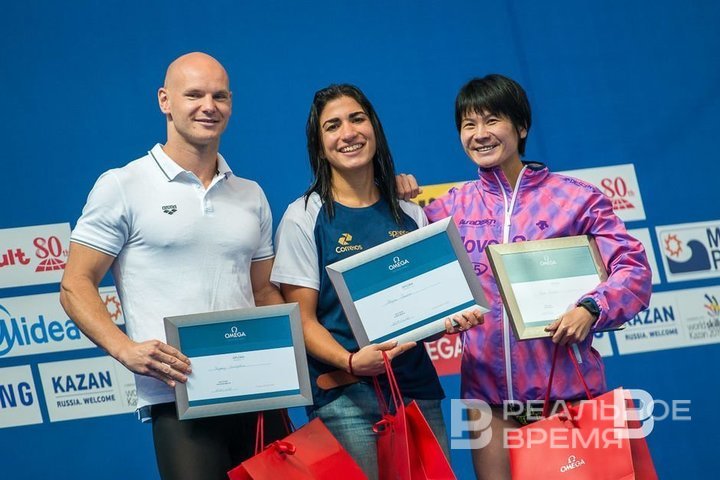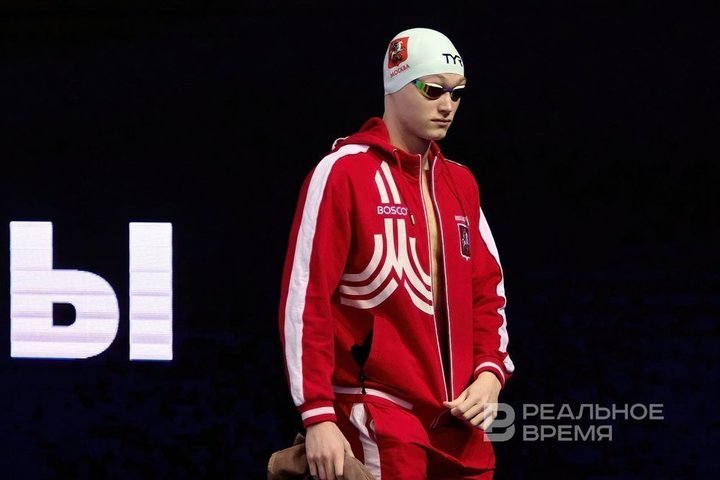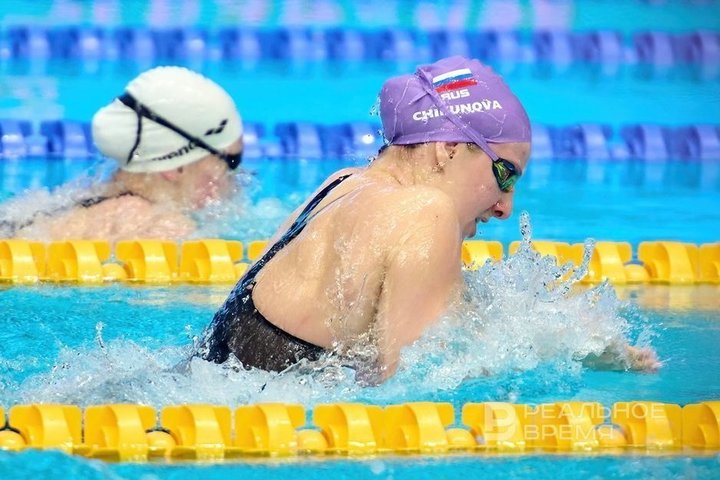Russian Swimming Cup: Kolesnikov and Chikunova expected to go the whole nine yards
This competition might be the last for some of the leaders of the national team

The Russian Swimming Cup kicked off in Yekaterinburg on 23 July. Team Tatarstan also includes a representative of Sintez sports club Nikolay Zuyev. Realnoe Vremya explains why the competition in the unofficial capital of the Urals can be considered as a challenge to Olympic swimming trials in Paris.
Russian Cup as a virtual battle with Olympic Paris
After the postponement of the Friendship Games until next year, the Russian Swimming Cup seems to be the most significant competition for swimmers at the end of the Olympic cycle. It is a tournament with an invisible competition swimming heats in Paris. To achieve this, the Russian Swimming Federation has increased the amount of bonuses to 2 million rubles if the winner of the national Cup shows a better time than an Olympic champion in Paris. Last year, this scheme was already in effect allowing Kliment Kolesnikov and Yevgenia Chikunova to earn extra money.
Now the same swimmers have a chance, also because the strongest swimmers in Russia did not take part in the BRICS Games. Thus, we didn’t force themselves to go an extra mile and reach the peak of their sporting shape. They could approach the competition in Yekaterinburg in a better condition, without the need for acclimatisation, which representatives of any non-European country will have in France, and without the Olympic hassle. In this part of the article, it is necessary to express respect for the decision of the leadership of the federation that limited the age of Russians before the start of the BRICS Games. Because not only the members of the national team lack competition practice but also the athletes from the youth and junior teams who made up for this deficiency by competing in Kazan.
We should keep in mind that the end of the Olympic cycle in any endurance sport, which includes swimming, is a change in the national team through making it younger when athletes decide that they are not ready to continue the training process for another 4 years. Since the Tokyo 2020 Olympics, which took place a year later, the team of swimmers has remained virtually unchanged losing only the leader of team Tatarstan Alexander Krasnykh who was forced to retire because of injuries. Later, Vladimir Morozov retired. And now there may simply be an avalanche-like retirement from the sport. It is clear that this is a purely personal matter, but often an attempt to prolong a career in sport for the sake of some external circumstances is not justified. Here we can recall the example of Yevgeny Korotyshkin, a brilliant swimmer, an excellent person who decided to extend his career in order to compete in the 2015 World Championship at home in Kazan. In the end, he was in Kazan and even swam but only in a PR competition because at the age of 32 he was not competitive on the domestic stage and could not make it to the team that was preparing for the Olympics in Rio.

Cities are closed but the results are outstanding
An extensive sports delegation from Tatarstan with 33 athletes travelled to Yekaterinburg — 15 men and 18 women, and this is the 5th largest team after Moscow, Saint Petersburg and the teams of Moscow and Nizhny Novgorod regions, which are slightly ahead of us.
Even the team of Sverdlovsk region, the “hosts of the water,” is looking very modest delegating only 15 people to the competition (10 men and 5 women). And this gives rise to some concern, since Sverdlovsk-44 (now Novouralsk) and Sverdlovsk-45 (now Lesnoy), that closed in Soviet times used to supply stars to the national teams of the country: Elvira Vasilkova (Sverdlovsk-44), her nephew Danila Izotov (Novouralsk) and Nikita Lobintsev (born in Sverdlovsk-44 shortly before it was renamed as Novouralsk) as well as Natalya Strunnikova, Alexander Popov and Konstantin Ushkov (all Sverdlovsk-45).
It is noteworthy is that they performed in duets — Vasilkova and Strunnikova at the 1980 Olympics in Moscow, Popov and Ushkov competed at the 1996 Olympics in Atlanta, and Izotov and Lobintsev did at the 2012 Olympics in London. Now the leader of regional swimming is Savely Luzin from Lesnoy, coach Alexander Kibenko is working with him. It was precisely an outflow of coaches when Galina Vitman, Popov’s first coach, returned to her native Volgograd, and a native of Krasnodar Lidiya Kapkova left the Urals. Coaches are one of the most pressing problems of Russian sports, a rarity, and their loss, unlike even athletes who come en masse, is irreplaceable.
By the way, two athletes of team Tatarstan Valeria Salamatina and Daria Ustinova are natives of the Urals, and now they will compete in their homeland. Let us remind you that they performed the team of our republic for almost the entire Olympic cycle.

How Tatarstan is handling the era without competition for two regions
Athletes’ discontent about financial support is already breaking through about athletes slowly, not yet loudly. It is no coincidence that at a meeting with Sports Minister Mikhail Degtyaryov Russian President Vladimir Putin ordered to ensure prompt payment of prize money to Russian athletes and coaches who achieved success at the BRICS Games in Kazan. Even though some media outlets had a picture of Alexander Maltsev, the only male synchronised swimmer, in their mind, the leadership of the country and the sport realisded that the value of the BRICS Games was also to provide athletes with decent sports scholarships putting the results in the tournament in line with ordinary international competitions, including the Olympics.
But not everyone competed at the BRICS Games; some planned to participate in the Friendship Games that were postponed to 2025. And now, some representatives of sports are struggling. On the condition of anonymity, Realnoe Vremya’s correspondent was told about the situation, which is quite typical for sports whose representatives did not participate in the BRICS Games.
For example, the salary of a member of the national teams of Russia and Tatarstan, the national champion, is 42,000 rubles. The total salary at the Central Sports Centre as an athlete and coach is 22,000 rubles. Plus, according to the resolution of the Cabinet of Ministers of the Republic of Tatarstan, the champion of Russia is paid 20,000 rubles monthly for gold. Previously, there was an opportunity to go to a European or world championship, win a medal there and receive more prize money: at the European Championships, our team showed off team competition, and this added another 40,000 rubles to their monthly salary. Now there are no international competitions, no additional payments either. It’s good that head of the Sports Training Centre Albert Bagautdinov, fought for a resolution to be developed to reward national champions as winners of international competitions. But there are nuances: the resolution is just being prepared, and if approved, it will be in effect from 2025, and it will apply only to national champions, not medallists.

International success moulded the amount of the sports scholarship at another level
And this ultimately leads to a change of citizenship. No one would even move anywhere if the results of the national championships were equated with the results of international competitions. International success allowed to mould a sports scholarship at a different level than now. Generally speaking, we are talking about a limited number of people. Taking into account the Tatarstan athletes who competed at the last Olympics in Tokyo (12 athletes in individual disciplines) and Beijing (plus eight more) who can be multiplied by three, also from the second and leaders of youth teams, we can count five to six dozen top-level athletes in Olympic disciplines. Is it really impossible to find decent funding for them, so as not to provoke their departure leading to losses of both world-class athletes and the funds spent on their preparation and so on?
We did some calculations and counted 8 million rubles from the republican budget that were spent on training a national team athlete, and this does not include federal funds. In other words, by saving on prize money, we are thereby ready to say goodbye to millions of rubles that we have already spent and no one will return to us. And the loss of the athletes’ money spent on them leads to a situation when their personal coaches lose the bonus for the athletes they had previously been training. The losses are obvious.
A person with a salary of 22,000 rubles can easily move to another region — but at least this is in Russia. It will be even easier to go to another country whose federation will skim the cream off the final product of our preparation. We must understand that the republic has seriously invested in the construction of sports facilities, but for some reason, we cannot spend “pennies” on retaining those whom we have already raised. Although the same Olympians’ Club project was created five years ago, with all the signatures of past and current Olympians.